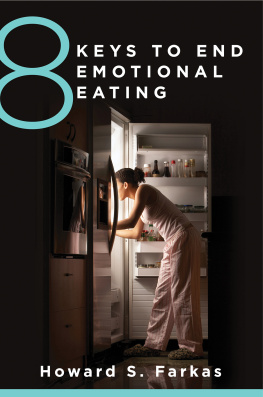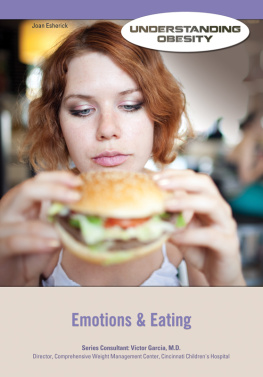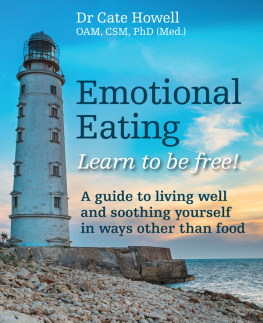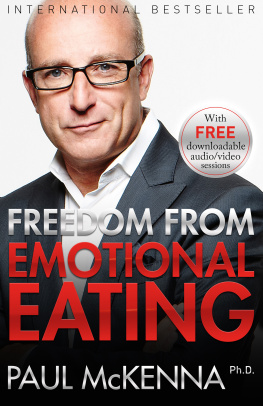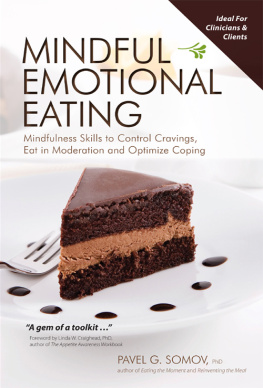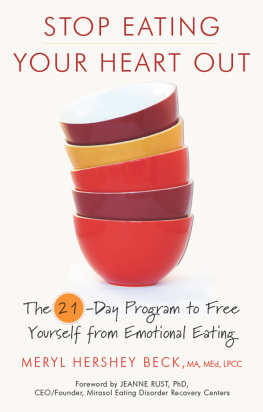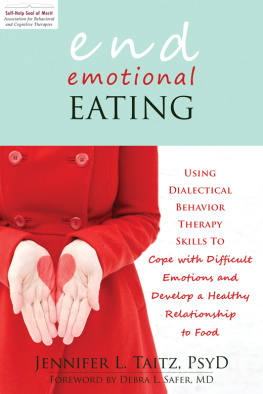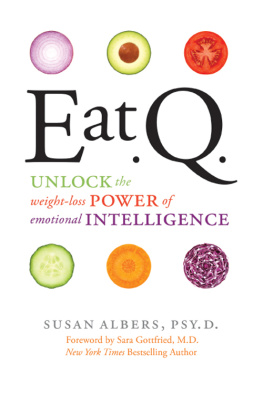
Contents
8 KEYS TO
END
EMOTIONAL
EATING
HOWARD S. FARKAS

W. W. NORTON & COMPANY
Independent Publishers Since 1923
8 Keys to Mental Health Series Babette Rothschild, Series Editor
The 8 Keys series of books provides readers with brief, inexpensive, and high-quality self-help books on a variety of topics in mental health. Each volume is written by an expert in the field, someone who is capable of presenting evidence-based information in a concise and clear way. These books stand out by offering consumers cutting-edge, relevant theory in easily digestible portions, written in an accessible style. The tone is respectful of the reader and the messages are immediately applicable. Filled with exercises and practical strategies, these books empower readers to help themselves.
Babette Rothschild, Series Editor, 8 Keys to Mental Health author of The Body Remembers, Volumes 1 & 2
Emotions usually go hand-in-hand with eating. Our feelings primarily dictate when, what, and with whom we eat. We eat to celebrate, to console, to get energized, to relax, to remember, to commune. We eat when we are anxious or sad, and we eat when we are happy and joyous. Who has not eaten, at times, to curb sexual frustration or enjoy an after-glow? The pairing of emotions with eating is normal and most of the time is not problematic. However, when normal eating behaviors mutate into emotional eating, that is, uncontrolled and unwanted eating, that is problematic. In this volume, 8 Keys to End Emotional Eating, Dr. Howard Farkas sheds a much-needed a spotlight on the types of emotional eating that are highly dysfunctional, leading to low self-image, weight gain, obesity, and ill physical and mental health.
Wherever you live and whatever your culture, you and I probably share a lot of similar experiences with dieting, weight loss, and diet books. Speaking for myself, over mynow fairly longlife (nearly 70! at this writing), I have probably read the majority of books on nutrition and weight loss, and I have tried most of the popular dietsWeight Watchers, Atkins (now renamed Ketogenic), The Zone, South Beach, Intermittent Fasting, and so on. Over the years I have had degrees of lesser and greater success.
Looking back, I can see that my relationship to food and eating, to myself, as well as body image, has gradually changed for the better. These days I rarely (less than once a month) overeat and never binge. Like most of my friends and colleagues, I have become much more conscious and conscientious about healthy food choices and portions. I eat fewer sweets than I used to, though I do make sure to have some dark chocolate everyday thank goodness for those studies that proved it is healthy! That said, with regard to weight and diet, I consider myself to continue to be a work in progress.
As I was reading this volume, I was reminded of the book that greatly impacted my relationship to food back in the early 1980s. Originally published in 1978, Susie Orbachs Fat is a Feminist Issue was revolutionary for me. My life altering takeaway was her view on the effects of dieting deprivation and how that sabotages weight loss. Following Orbachs manifesto, I began keeping forbidden foods on hand in my home and allowing myself to eat them guilt free! whenever I wished. At first I was nervous to let myself loose in this way. But what I found out was this: when those foods I was used to craving were readily available, my longing for them gradually diminished. That is not to say that I lost interest in them altogether, but that I discovered that I indulged them significantly less frequently and in smaller amounts than I would have ever predicted. This change did not happen immediately, nonetheless, within a relatively short period of time I felt (and became) in control of my cravings. Since, I have continued to follow that same advice. Many of my friends gasp when they see that I keep multiple kinds of chocolate and other sweets, as well as temptations such as potato chips in my cupboards and fridge. And they are equally surprised to find out that I do not eat them all at once, all the time, or even everyday. Its a comfort for me to know those treats are there when I want them, not forbidden, so I find that I want them much, much less. This is actually the same philosophy used by the famous and much beloved Sees Candies. The rule in their shops is that employees can eat as much of the chocolates as they want. No restrictions! Many times I have asked a sales person how they manage it. Invariably each has told me that initially they eat several candies a day, but that quickly it looses its allure. In fairly quick shift they pare down to one piece, or even none, per day. All would agree that giving employees free access to the chocolate is a very wise policy!
The reason I am telling these stories is because I was very happy to find that one of Farkass central recommendations is similar. As he puts it: No food is forbidden. He writes, There are no foods that you must avoid. and Every thing is on the menu; the only question is: What do you want to eat? I do not have an abstract understanding of this viewpoint. This is something that I have experienced and lived, for decades, so I have to agree. It saddens me when a friend tells me that they can not keep this or that beloved food in their home because they do not believe they can control their urges and cravings.
This is not a diet book. It is a life book. Throughout 8 Keys to End Emotional Eating, Farkas will help you to gain control over this aspect of your life that feels out of control. He is not going to tell you what to eat or how to diet. It is not a nutritional guide. Farkas is not going to talk to you about the usual emotions most people associate with overeating: sadness, anxiety, depression. Those topics already proliferate the libraries of people struggling with overeating and being overweight. And, unfortunately, for many readers, those books do not give them the help they hoped to find: to really, once and for all, conquer their relationship with food and maintain healthy eating and a healthy weight. Farkas has looked far further into the roots of overeating, down to the core: He will help you to change your relationship with food and with yourself.
Megan
Megans friends were taking her out to celebrate her engagement, and they chose her favorite place for dinner. She and her fiance decided to get married in six months. Megan was determined to lose the weight she had gained over the past year, so she could walk down the aisle with confidence. She planned to begin a new diet the next day.
When she joined the others at the table, the server had just taken her friends orders and asked Megan if she needed some more time to look at the menu.
No thanks, I know exactly what I want, she replied.
She knew that the best item on the menu was the blackened redfish, grilled and seasoned just right, and she was looking forward to having it again. It was also one of the lower-calorie options available and would be a good way to restart her diet.
As the server turned to put in the orders, Megan saw someone at the next table get the three-cheese lasagna. She had tried it once before and thought it was nothing special, certainly not as good as the blackened redfish, and definitely not worth the extra calories. But now she decided that she wanted it anyway and asked the server to change her order.
The next morning, she went online to find a therapist who could help her with emotional eating and made an appointment to see me the following week.
Next page
